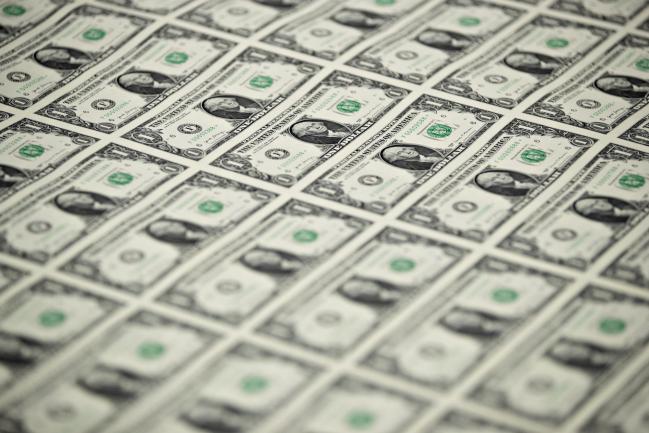(Bloomberg) -- The U.S. might be the trigger for escalating trade tensions with China, but it turns out that its currency could still be the best place for global investors to find safety as the dispute comes to a fresh crossroads Friday with tariff increases set to take effect.
That’s because the conflict is unfolding alongside what could be an even more powerful dynamic: U.S. monetary-policy normalization. An appreciating dollar, propelled by expectations for stepped-up Federal Reserve tightening, has hammered a wealth of markets since April, when benchmark 10-year Treasury yields first pricked through 3 percent. That’s left some traditional havens -- like gold -- less of a buy, while offering pockets of value -- such as Australian equities -- in areas investors might not typically have considered.
The ultimate refuge, investors and strategists say, is the greenback. Dollar-based money market funds are now offering rates of about 2 percent, a level above the yield on seven-year Treasuries as recently as last September.
“The U.S. dollar is now the most popular safe-haven asset,” said Cheuk Wan Fan, head of investment strategy for Asia at HSBC Private Bank. For a premium, the bank is recommending dollar-denominated emerging market debt, where yields have climbed in response to Fed tightening.
President Donald Trump’s trade actions started unsettling investors in March, when he warned about imposing new tariffs on aluminum and steel imports, and investors have had several rounds of escalating tensions with China to gauge how assets respond. One of the stand-out observations is that a trio of typical havens haven’t been doing so well.
- Gold, a haven for millennia in times of turmoil, hasn’t been so hot the past three months, falling more than 5 percent.
- Japan’s yen, often a safe harbor thanks to the country’s status as the world’s biggest net creditor, has dropped almost 3 percent in that period.
- Switzerland’s franc, another favorite for the cautious, is also down 3 percent.
- Behind the declines of all three has been the appreciation of the dollar, up more than 4 percent as measured by the Bloomberg Dollar Spot index.
The acceleration in Fed normalization also played a role in the declines, with the U.S. central bank rolling off $40 billion of its bond holdings a month at the current pace, and anticipating another half point in rate hikes this year. While the monetary-policy outlook has implications for Treasuries, they are still seen by some as a buffer if global equities get roiled by fears that a trade war will damage global growth.
Equities Drop
“They are a safe haven even when shocks come from the United States,” Patrick Artus, chief economist at Natixis Securities, wrote of U.S. government securities in a note this week.
Equities were on the back foot in Asian trading Thursday, ahead of the scheduled U.S. tariff hike on $34 billion worth of Chinese products. The MSCI Asia Pacific Index dropped for a fourth straight day, to the lowest level since last October. U.S. stocks rose 0.7 percent in light trading Thursday as of midday New York time.
China has pledged to retaliate against the American move, a response which Trump has indicated would then trigger an escalation in tensions. Trump has suggested higher tariffs could be imposed on as much as an additional $400 billion of Chinese imports.
More Volatility
“Investors should expect volatility to continue,” said Mark Haefele, chief investment officer at UBS Global Wealth Management. “We recommend investors stay invested, but consider five actions: looking to alternatives, hedging equity exposure, improving credit quality, diversifying sector and country risks, and taking a longer-term view.”
The other main combatant in the trade dispute has seen its own government bonds rally this year -- in part thanks to moves by the People’s Bank of China to support liquidity in an effort to prevent a deeper hit to economic growth. Shaniel Ramjee, a senior investment manager at Pictet Asset Management in London, recommending yuan-denominated Chinese government bonds.
The dollar’s strength in recent months has had the knock-on effect of boosting Australian shares, which have repeatedly offered a touch of green amid a picture of red for Asia-Pacific equities in recent weeks. James Audiss, a senior wealth manager with Shaw and Partners Ltd. in Sydney, says the Australian currency’s drop has bolstered the appeal of the country’s companies -- even if a trade war could damage its exports.
Aussie Stocks?
“I’ve been talking to my guys on the desk saying, we’ve got to really watch the fact that we’ve seen the Aussie dollar come off -- which is actually benefiting the Australian equities market,” Audiss said.
Some investors, including Alex Treves, an investment specialist at JPMorgan (NYSE:JPM) Asset Management in Hong Kong, advise looking through the trade headlines and keeping focused on fundamental analysis.
Treves likes emerging markets with solid growth prospects, such as India, where the S&P BSE Sensex Index is up about 2 percent since the end of the first quarter in dollar terms, compared with a 9 percent tumble for the MSCI Emerging Markets Index.
For others, riskier assets can hold for later, once the storm blows over.
“Liquidity management instruments such as money market funds” are good for investors to park cash in dollars, said Fan at HSBC. “When more attractive levels emerge, they can put cash back to work,” she said.
And some still like the old stand-bys.
“We’re not giving up on a view that the yen is a good hedge for further turmoil and a further rise in FX volatility,” Kit Juckes, a Societe Generale (PA:SOGN) SA strategist in London, wrote in a note to clients earlier this week. “It’s taking an age, driving us to distraction, but the cycle is rolling over in the yen’s favour. Short Aussie-yen has growing appeal given the trade dispute.”
(Updates U.S. stock prices in ninth paragraph.)
